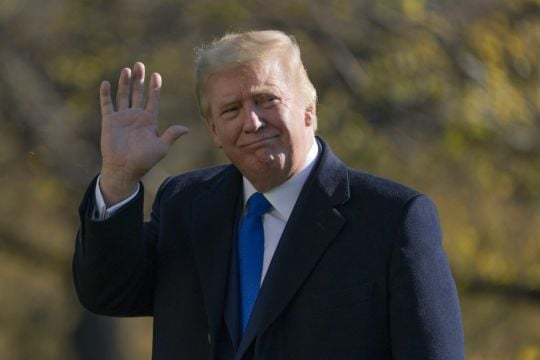Donald Trump stood before a White House lectern and delivered a 46-minute diatribe against the election that produced a win for Democrat Joe Biden, uttering a series of claims to back his baseless assertion that he really won.
Appearing increasingly detached from reality, Mr Trump called his address, released Wednesday only on social media and delivered in front of no audience, perhaps “the most important speech” of his presidency.
But it was largely a recycling of the same litany of misinformation and unsubstantiated allegations of voter fraud that he has been making for the past month.
Mr Trump, who spoke from the Diplomatic Room, kept up his futile pushback against the election even as state after state certifies its results and as Mr Biden presses ahead with shaping his Cabinet in advance of his inauguration on January 20.
The president’s remarks raised questions about how far he may be willing to go in his campaign to overturn Mr Biden’s win, including whether he might press Republicans in Congress to block certification of the vote, a move that has been floated by the president’s allies.
Mr Biden received a record 81 million votes compared to 74 million for his opponent. The Democrat also won 306 electoral votes compared to 232 for Mr Trump. The Electoral College split matches Mr Trump’s victory over Hillary Clinton four years ago, which he described then as a “landslide”.
Mr Trump dug further into his contention of a “rigged election” even though members of his own administration, including Attorney General William Barr, say no proof of widespread voter fraud has been uncovered. Courts in multiple battleground states have dismissed a barrage of lawsuits filed on behalf of the president.
“This is not just about honouring the votes of 74 million Americans who voted for me,” Mr Trump said. “It’s about ensuring that Americans can have faith in this election. And in all future elections.”
In fact, his baseless claims are having the opposite effect — undermining public faith in the integrity of US elections.

About an hour after it was posted, Mr Trump’s video had been viewed hundreds of thousands of times on Facebook and shared by more than 60,000 Facebook users. Both Facebook and Twitter flagged the president’s posting as problematic, with Twitter noting Mr Trump’s claims about election fraud were disputed.
Julian Zelizer, a professor of political history at Princeton University, said the nation has seen close elections before — 1800, 1876 and, most recently in 2000 – but this year’s election did not fit in that category.
“This is just a random baseless attack on the entire election,” Mr Zelizer said. “Trump has no turning point. I often say there are parallels or precedents, but there aren’t in this case. He keeps bending norms.”
Mr Trump said the election results should be “overturned immediately” in several battleground states and suggested the Supreme Court should intervene in his favour, saying: “Hopefully, they will do what’s right for our country because our country can’t live with this kind of an election.”

But chances are remote that the Supreme Court would become involved. No appeals claiming fraud have been filed at the high court. Pennsylvania Republicans want the justices to prevent certification of Mr Biden’s win in the state, but their appeal alleges Pennsylvania’s vote-by-mail law is unconstitutional, not fraud. The state Supreme Court already has dismissed the lawsuit.
Many of Mr Trump’s claims have been debunked repeatedly in recent weeks.
His overarching claim: “This election is about great voter fraud, fraud that has never been seen like this before.”
In fact, Christopher Krebs, the director of the Department of Homeland Security’s Cybersecurity and Infrastructure Security Agency, voiced confidence in the integrity of the election ahead of the November vote. And afterward, he ruled out allegations that the count was tainted by fraud – comments that days later were followed by his sacking by Mr Trump.
Mr Barr, in an interview with The Associated Press on Tuesday, said the Justice Department has uncovered no evidence of widespread voter fraud that could change the election outcome.
Meanwhile, lawyers for Wisconsin’s Democratic governor Tony Evers have said in filings with the state’s Supreme Court that Mr Trump’s attempt to overturn Wisconsin’s election results by tossing ballots only from the state’s two most heavily Democratic counties is an “assault on democracy”.
The filings come as the state’s highest court is weighing Mr Trump’s request to disqualify more than 221,000 ballots in Milwaukee and Dane counties. Mr Biden defeated Trump by a 2-to-1 margin in those counties on his way to a 20,682-vote win state-wide.
Mr Trump is not challenging any ballots in the state’s other 70 counties, the majority of which he won.
“President Trump’s (lawsuit) seeks nothing less than to overturn the will of nearly 3.3 million Wisconsin voters,” Mr Evers’ lawyers said. “It is a shocking and outrageous assault on our democracy.
“He is simply trying to seize Wisconsin’s electoral votes, even though he lost the statewide election.”







